Open Engagement has invited a group of contributors to make this year’s blog into a timely resource for organizing, moving forward and thinking creatively during particularly unjust times.
In light of our current reality and to align with this year’s conference theme of JUSTICE these blog posts will feature strategies, testimonies, literature, art and instructions as tools for working and living in the world as we know it.
The 2017 blog project, Resources on Justice, will grow over time, be published incrementally and will feature responses from a wide range of participants including activists, writers, thinkers, artists, teachers, arts professionals, community leaders, cultural workers, and more. It is an inclusive and accessible platform to think through the conference theme, introduce dialogues specific to the conference’s host city, as well as instigate ideas that can be applied beyond the context of this conference.
About the contributor: Marisa Morán Jahn is an artist, activist, and founder of Studio REV-, a non-profit organization that produces public art + creative media with low-wage workers, immigrants, and youth. She teaches at MIT and The New School. Her current projects include CareForce (mobile studios: the CareForce One and NannyVan), Video Slink Uganda, Bibliobandido. Marisa shares with us her Top 5 Resources on Justice on the blog.
1. Cassils, Transliberation
Cassils is a transgender artist whose powerful works are particularly resonant right now. Here is a video Cassils created in response to the Pulse night club shooting. I recall watching this for the first time and crying from its power; the retrenchments of LGBTQA rights under the new administration invoke that same horror and shock. Here is a link to more of Cassils’ work. When showing their work to students I first show them the wikipedia definition of transhysteria which we discuss and address.
2. Immigration Resources
Women Step Forward is an easy-to-use website that offers step by step instructions to guide individuals with different immigration status towards trusted, verified resources. You can also find trusted, vetted lawyers (since a lot of immigrants face fraud in legal processes), advocacy pipelines, and options. The site and its resources were created after the election by We Belong Together, an initiative of the National Domestic Workers Alliance (an organization with whom I work closely) and the National Asian Pacific American Women’s Forum (who support immigrant, women leaders).
3. Digital Inclusion
Stemming from a long-standing curiosity about the technologies of intimacy (extimacy) such as letter-writing, the Roman postal network, Ugandan bootleg industries, Afghan fighters composing love poems to their enemies via bluetooth, etc., I’ve been recently fascinated by the rhetoric of so-called “networked economy” whose de-territorialized metaphors (“the cloud”) belie an ecology of server farms relaying messages to select countries via underwater sea cables lain by 19th century colonial allies. How do these infrastructures reify hegemony or alternately, support digital inclusion? For example, in 2016, Facebook and the entrepreneur Elon Musk sent a satellite into space (which exploded), intending to “bring Facebook to Africa” — an undertaking that provokes a question about how corporate-owned proprietary networks produce a new form of reliance and dependency.
For more information about the politics of a digital economy on which most of us depend, I recommend Nicole Starosielski’s amazing book, The Undersea Network.
4. Grow the movement! Provide childcare at political gatherings!
Providing childcare at political gatherings (and ideally cultural gatherings as well) helps grow the movement. Let me unpack this a bit. Having a kid is expensive. National estimates say that the average cost of having a cost is about $13,000 and it gets even more expensive in urban areas. So paying for a babysitter isn’t always an option for people — especially artists, activists, lower-income folks, and those from frontline groups. Without organized childcare at events, we thus exclude many from participating and end up with insular conversations. When we do include childcare, those kids develop life-long friendships with their peers within the movement and the arts community. Plus, older, more experienced activists who have kids are able to participate and share knowledge; they are also reinvigorated by younger artists — so this is a two-way street.
Organizing cooperative childcare can be low-cost or free. I remember going to punk disco dance parties in Canada where they provided childcare. And many immigrant groups and most domestic worker groups offer childcare at meetings. They simply asked those from their community to volunteer. If you do want to turn to domestic worker and childcare coops for support, here are two:
- Beyond Care (Brooklyn) is a child care services cooperative created and run by professional nannies.
- ChiChiCo (Chicago) is a group of volunteers who support the participation of parents, especially mothers, in racial and economic justice work. The collective matches volunteers with community organizations across the city to have fun with kids while their parents participate in and lead organizing efforts to defend their rights and build a better Chicago.
5. Screenprints from the series Solutions for the CareForce
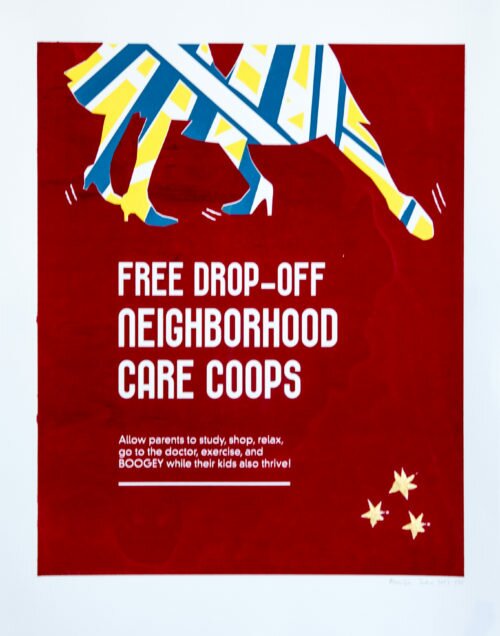
Title: Mamas Wanna Dance (from the series, Solutions for the CareForce)
Authorship: Marisa Morán Jahn (Studio REV-)
Date: 2017
Medium: Silkscreen (1 of 10)
Dimensions: 19” x 25”
Photo Credit: Taehee Whang, 2017
Special Thanks: Taehee Whang
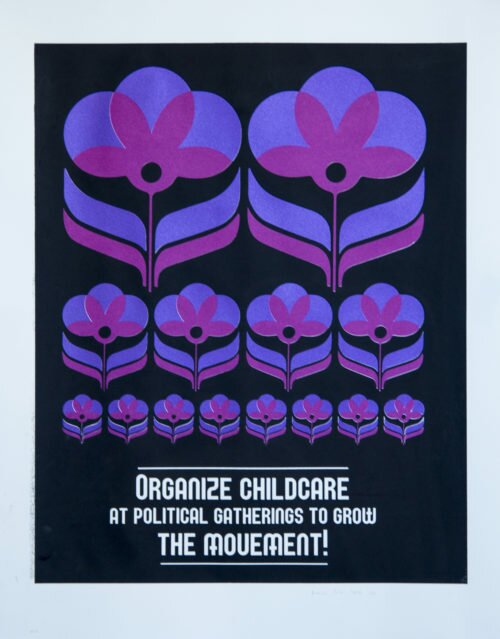
Title: Grow the Movement (from the series, Solutions for the CareForce)
Authorship: Marisa Morán Jahn (Studio REV-)
Date: 2017
Medium: Silkscreen (1 of 10)
Dimensions: 19” x 25”
Photo Credit: Taehee Whang, 2017
Special Thanks: Taehee Whang
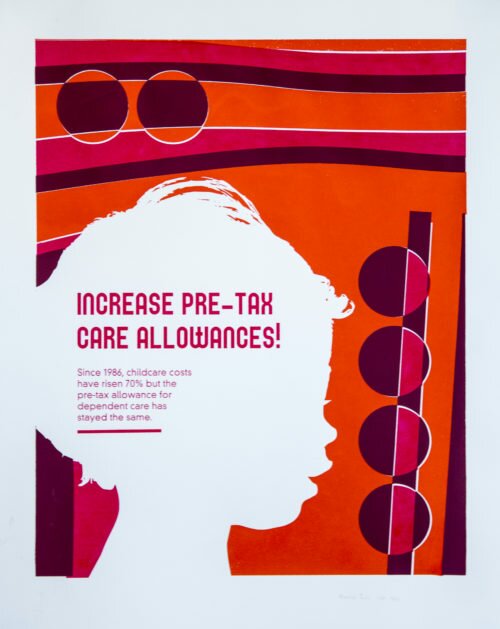
Title: Increase America’s Pre-Tax Care Allowance (from the series, Solutions for the CareForce)
Authorship: Marisa Morán Jahn (Studio REV-)
Date: 2017
Medium: Silkscreen (1 of 7)
Dimensions: 19” x 25”
Photo Credit: Taehee Whang, 2017
Special Thanks: Taehee Whang
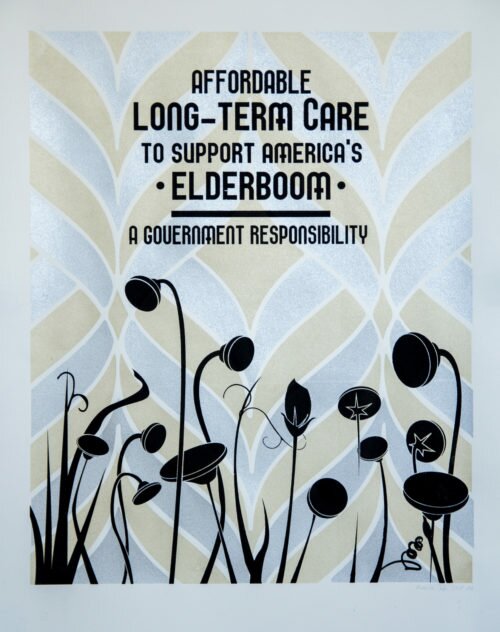
Title: Support America’s Elderboom (from the series, Solutions for the CareForce)
Authorship: Marisa Morán Jahn (Studio REV-)
Date: 2017
Medium: Silkscreen (1 of 10)
Dimensions: 19” x 25”
Photo Credit: Taehee Whang, 2017
Special Thanks: Taehee Whang
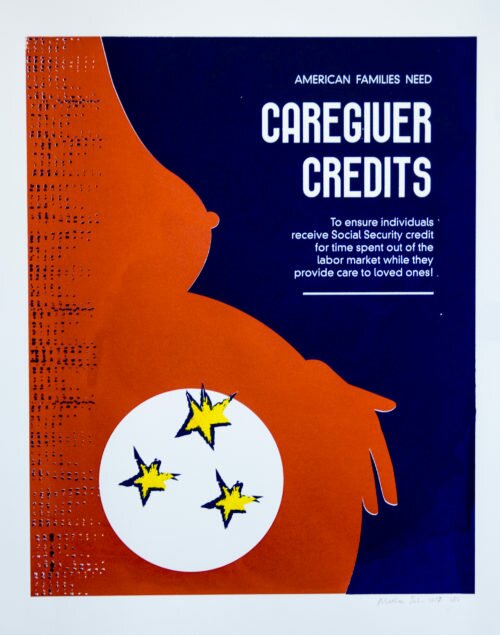
Title: Caregiver Credits (from the series, Solutions for the CareForce)
Authorship: Marisa Morán Jahn (Studio REV-)
Date: 2017
Medium: Silkscreen (1 of 7)
Dimensions: 19” x 25”
Photo Credit: Taehee Whang, 2017
Special Thanks: Taehee Whang
